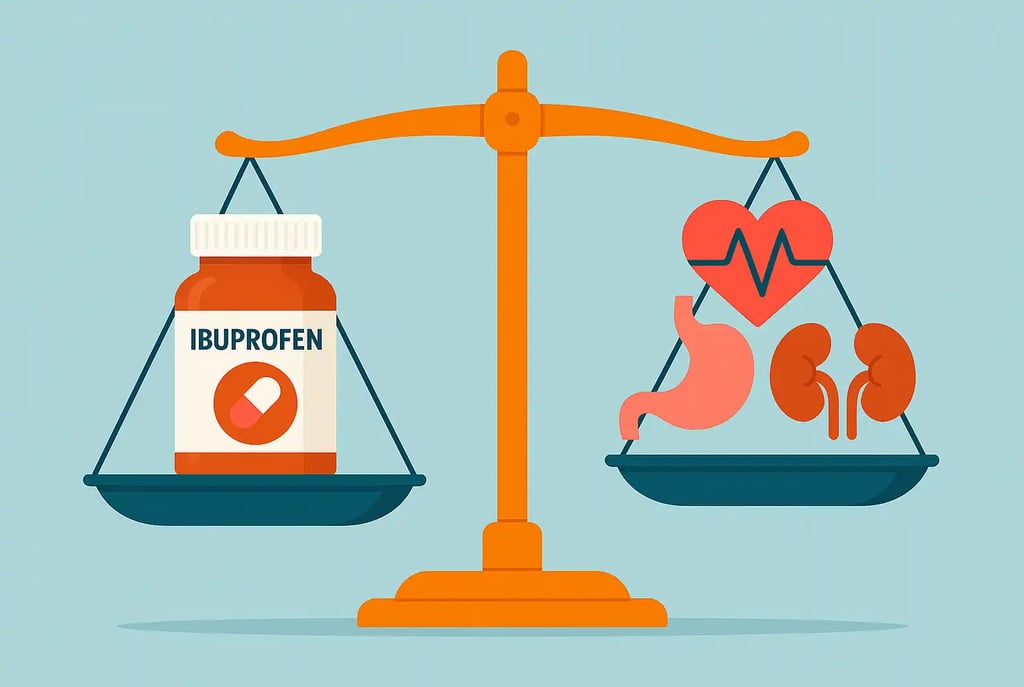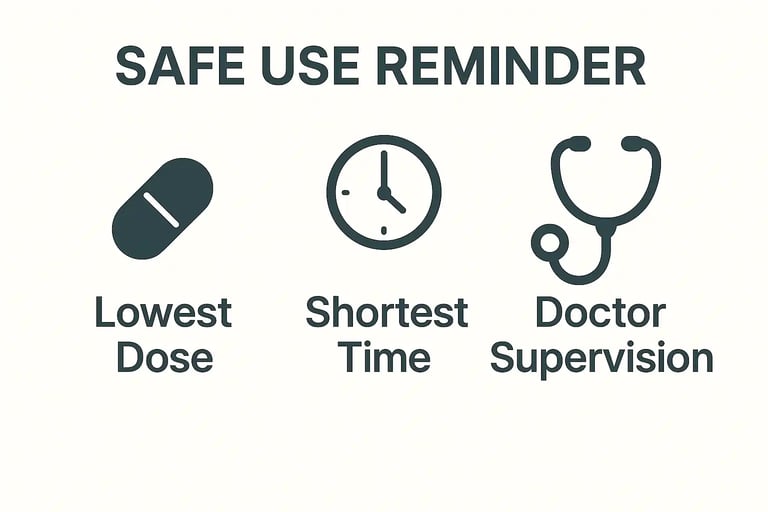Daily Ibuprofen Use: Risks, Long-Term Effects, and What Doctors Recommend
Daily ibuprofen use can relieve pain but carries risks for the stomach, kidneys, heart, and liver. Learn the long-term effects, safer alternatives, and what doctors recommend for responsible use.


Daily Ibuprofen Use: Risks, Long-Term Effects, and What Doctors Recommend
Ibuprofen is one of the most commonly used medications for pain, fever, and inflammation. For many people, it’s a go-to choice for headaches, sore muscles, inflammation, or minor injuries. Taken occasionally, and at the right dosage, it’s generally safe. See The Complete Guide to Ibuprofen: What it Does, When to Use it & How to Stay Safe.
But what happens when ibuprofen becomes a daily habit? The answer is more complex, because regular use can carry risks that are easy to overlook.
Why Daily Ibuprofen Use Raises Concerns
Ibuprofen works by blocking enzymes that produce prostaglandins — substances that trigger pain, fever, and inflammation. While this makes you feel better, prostaglandins also serve important protective roles in the body. They help maintain the stomach lining, support healthy kidney function, and regulate blood flow. So when ibuprofen is taken every day, these protective functions can be disrupted and over time, the disruption increases the risk of side effects and health complications.
The Risks of Long-Term Ibuprofen Use
Daily ibuprofen use doesn’t just dull pain — it can also put added stress on vital organs. Some of the most common and concerning long-term effects include:
Digestive System Complications
One of the best-known risks of chronic ibuprofen use is stomach irritation. By reducing protective prostaglandins in the stomach lining, ibuprofen can make the digestive tract more vulnerable to acid. This increases the chance of ulcers, gastrointestinal bleeding, and chronic indigestion. In some cases, these issues can become serious enough to require medical treatment.
Kidney Damage and Fluid Retention
The kidneys rely on a steady blood flow to function properly, and prostaglandins play a role in that process. Taking ibuprofen every day can interfere with kidney function, sometimes leading to fluid retention, swelling in the legs and ankles, or even long-term kidney damage. People with pre-existing kidney problems are at an even higher risk.
Heart and Circulatory Problems
Another concern with daily ibuprofen use is its effect on the cardiovascular system. Long-term use has been linked to higher blood pressure and an increased risk of heart attack or stroke, particularly in people with heart disease or other risk factors. This is why doctors generally recommend caution when ibuprofen is taken regularly over long periods.
Liver Stress
While less common than stomach or kidney complications, ibuprofen can also put stress on the liver — especially when combined with alcohol or other medications. In rare cases, this can lead to liver damage, making routine monitoring important for anyone taking ibuprofen on a daily basis.
What Doctors Typically Recommend
Most healthcare providers agree that ibuprofen should not be used daily unless absolutely necessary, and under medical supervision. If daily use is unavoidable, doctors usually recommend:
Taking the lowest effective dose possible
Limiting the duration of use to the shortest time necessary
Scheduling regular checkups and lab tests to monitor kidney, liver, and cardiovascular health
Using protective medications, when appropriate, to help reduce the risk of stomach irritation and ulcers
The guiding principle is that ibuprofen should be a tool for short term pain relief, not a long-term solution for managing chronic pain without medical oversight.
For more, check out Managing Ibuprofen Side Effects: What to Watch for & How to Minimize Risk.
Considering Safer Alternatives
If you find yourself reaching for ibuprofen every day, that may be a sign that it’s time to explore other options. Depending on the type of pain, alternatives might include:
Acetaminophen, which relieves pain and fever but does not carry the same stomach risks as ibuprofen
Physical therapy, exercise, and stretching to improve mobility and reduce chronic discomfort
Heat or cold therapy for muscle and joint issues
Prescription treatments or other nonsteroidal anti-inflammatory drugs (NSAIDs) that may be safer for long-term use under supervision
Lifestyle adjustments, including weight management, diet changes, and stress reduction, which can all reduce inflammation and pain over time
For information on Natural Alternatives for pain relief, or other common pain relievers, click here.
The Bottom Line
Ibuprofen is highly effective for short-term relief of pain and inflammation, but daily or long-term use is a different story. Over time, it can lead to digestive issues, kidney problems, cardiovascular risks, and liver stress.
For most people, ibuprofen is best used occasionally, not as part of a daily routine. If you find yourself depending on it every day, it’s time to talk with a healthcare provider about safer and more sustainable ways to manage your pain.




